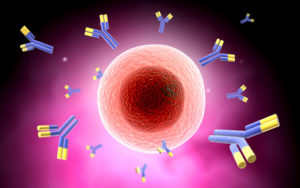The risk of alloimmunization to polymorphic RBC antigens is high for individuals who undergo chronic transfusion therapy. Researchers recently utilized murine models for three RBC antigens—KEL (Kell blood group antigen), HOD (hen egg lysosome, ovalbumin and Duffy fused together in one protein), and GPA (human glycophorin A) — to determine if immunization of one RBC antigen can directly increase the alloimmunization of another RBC antigen. In the presence of inflammation induced by poly I:C (PIC), transfusion with RBCs expressing KEL enhanced anti-KEL antibody production through a CD4+ T cell-dependent process. Further transfusion of RBCs expressing both KEL and HOD in mice already primed with PIC/KEL induced increased expression of anti-HOD antibodies, whereas transfusion of KEL RBCs with HOD RBCs or KEL or HOD RBCs alone did not increase expression of anti-HOD antibodies. Furthermore, this observation was not specific to KEL and HOD antigens; HOD-reactive CD4+ T cells increased GPA antibody production after transfusion of RBCs expressing both HOD and GPA. Thus, priming of one RBC antigen can trigger alloimmunization to other RBC antigens, which may help explain why some individuals are more prone to become alloimmunized to multiple RBC antigens. Future research is needed to understand how this relates to other factors that influence alloimmunization to RBC antigens.
Reference:

